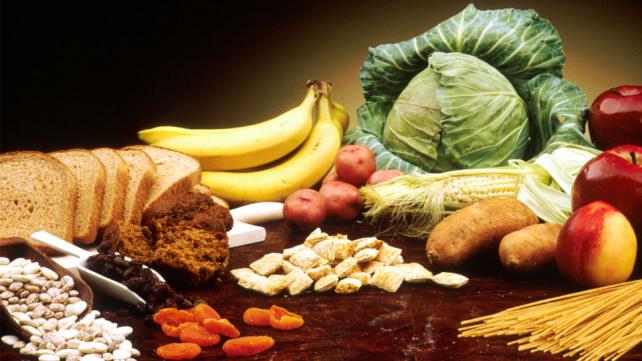
Grain products, vegetables, and fruits are key parts of a varied diet. They are emphasized in this guideline because they provide vitamins, minerals, complex carbohydrates (starch and dietary fiber) and other substances that are important for good health.
They are also generally low in fat, depending on how they are prepared and what is added to them at the table. Most Americans of all ages eat fewer than the recommended number of servings of grain products, vegetables, and fruits, even though consumption of these foods is associated with a substantially lower risk for many chronic diseases, including certain types of cancer.
Most of the calories in your diet should come from grain products, vegetables, and fruits
These include grain products high in complex carbohydrates-breads, cereals, pasta, rice-found at the base of the Food Pyramid Guide as well as vegetables such as potatoes and corn.
Dry beans (like pinto, navy, kidney, and black beans) are included in the meat and beans group of the Pyramid, but they count as servings of vegetables instead of meat alternatives.
Plant foods provide fiber
Fiber is found only in plant foods like whole-grain breads and cereals, beans and peas, and other vegetables and fruits. Because there are different types of fiber i foods, choose a variety of foods daily. Eating a variety of fiber-containing plant foods is important for proper bowel function, can reduce symptoms of chronic constipation, diverticular disease, and hemorrhoids, and may lower the risk for heart disease and some cancers.
However, some of the health benefits associated with a high-fiber diet may come from other components present in these foods, not just from fiber itself. For this reason, fiber is best obtained from foods rather than supplements.
Plant foods provide a variety of vitamins and minerals essential for health
Most fruits and vegetables are naturally low in fat and provide many essential nutrients and other food components important for health. These foods are excellent sources of vitamin C, vitamin B, carotenoids (see below), including those which form vitamin A, and folate. The antioxidant nutrients found in plant foods (e.g. vitamin C, carotenoids, vitamin E, and certain minerals) are presently of great interest to scientists and the public because of their potentially beneficial role in reducing the risk for cancer and certain other chronic diseases. Scientists are also trying to determine if other substances in plant foods protect against cancer.
Some good sources of Carotenoids
Dark-green leafy vegetables (such as spinach, collards, kale, mustard greens, turnip greens), broccoli, carrots, pumpkin and calabasa, red pepper, sweet potatoes, and tomatoes.
Fruits include mango, papaya and cantaloupe.
Photo Attribution: http://commons.wikimedia.org/wiki/File:Fruit,_Vegetables_and_Grain_NCI_Visuals_Online.jpg





Add new comment